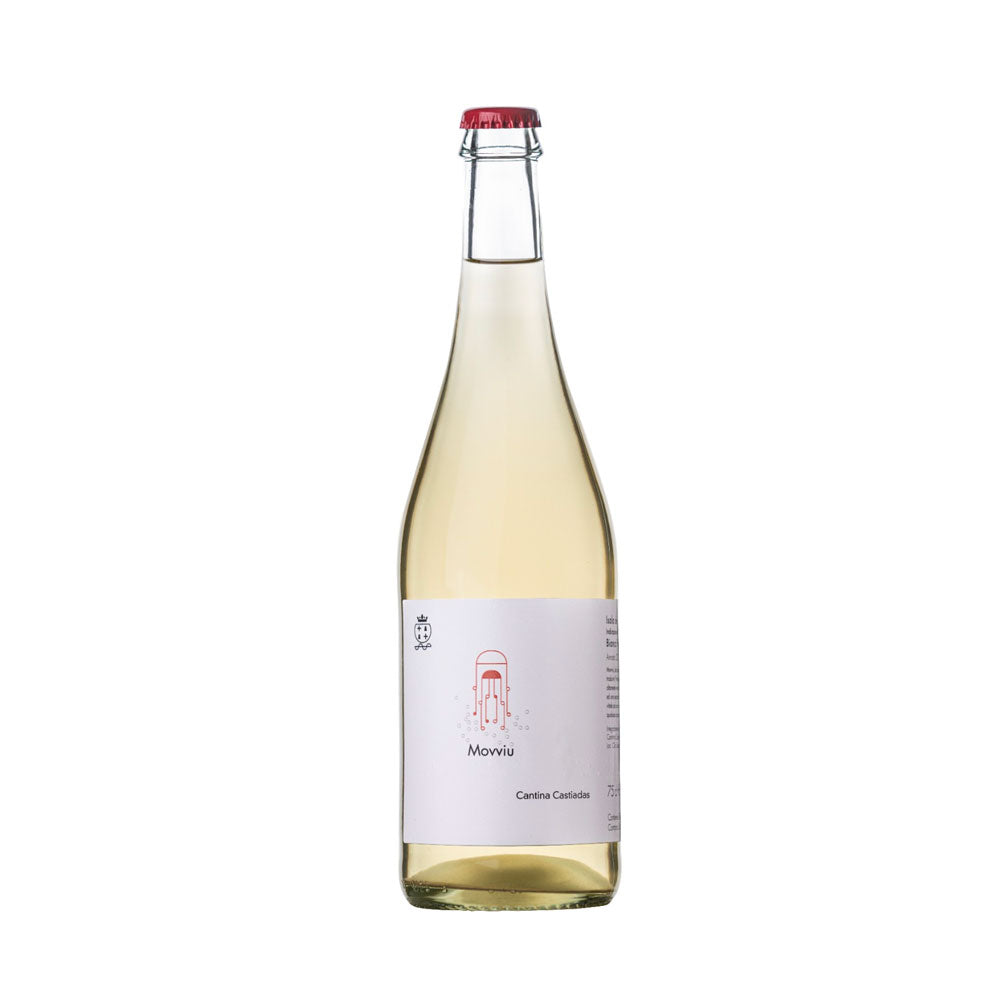
Movviu | Castiadas
NAME: Isola dei Nuraghi IGT
TYPE: sparkling
GRAPE VARIETY: Cannonau
ORIGIN: Italy, Sardinia
EVOLUTION: 1 year
SERVING TEMPERATURE: 6-8° C
RECOMMENDED GLASS: narrow glass, for sparkling wine
ALCOHOL VOLUME: 13%
FORMAT: 75 cl
THE WINE:
TECHNICAL SPECIFICATIONS
FRESHNESS: ◼︎◼︎◼︎◼︎◻︎
BODY: ◼︎◼︎◼︎◻︎◻︎
FLAVOUR: ◼︎◼︎◼︎◻︎◻︎
SOFTNESS: ◼︎◼︎◼︎◻︎◻︎
NOTES FROM OUR SOMMELIERS
👁 cloudy straw yellow;
👃🏻 on the nose it expresses itself on mineral notes, citrus fruits, flowers and bread;
👄 on the palate it is fresh, intense and fragrant. Very pleasant.
RECOMMENDED COMBINATION
Perfect for the whole meal, from appetizers to light second courses . Try it with aubergine quiche.
REFINEMENT
A real company innovation, which enhances the characteristic of the vine which, with its acidic part, lends itself very well to sparkling wine: c annonau vinified in white and refermented, for a fresh, fun and ready-to-drink sparkling wine.
The refermentation in the bottle without disgorgement leaves the yeasts in suspension. There are two ways to taste it: shake the bottle slightly to make everything uniform or let the yeasts settle to the bottom.
YOU WILL LOVE IT FOR...
its freshness.
TERRITORY OF ORIGIN:
TERROR
The cultivation of vines was introduced in Sardinia when the Phoenicians settled on the island and founded their colonies in the fertile southern areas, between the 8th and 7th centuries BC. Even today, in the Sulcis area, in Campidano and in Gallura, the The names of some Sardinian villages, of Phoenician origin, recall the vine and its fruit.
The Romans found modern viticulture on the island, which was developed, but the trade stimulated by agriculture and viticulture slowed down significantly with the collapse of the Roman Empire. The wine sector remained anonymous for centuries, until the subsequent dominations of the Byzantines and the Arabs. From the end of the fifteenth century Sardinia became a Spanish province, which had negative consequences for agriculture. The only positive data is the introduction of Iberian vines (including Cannonau).
With the Savoy domination the fortunes of viticulture improved. Since 1949, having obtained administrative independence, many social wineries have arisen, starting the path of quality for Sardinian wine.
By extension, Sardinia is the second largest island in the Mediterranean; its territory is 80% mountainous and hilly (of which 68% is made up of hills and rocky plateaus). Some characteristic soils are called giare or gollei, if granitic or basaltic, others, instead, heels or tonneri, if sandstone or limestone.
The climate is Mediterranean. The average altitude is 334 meters above sea level, although the highest massif on the island, the Gennargentu, reaches 1834 metres, while other lower massifs are found in Gallura, Sarrabus and Iglesiente-Arburese.
The region has 1 DOCG (Vermentino di Gallura) and 17 DOC.
The main native white grape varieties: Malvasia Bianca, Malvasia di Sardegna, Nasco, Nuragus, Semidano, Torbato, Vermentino, Vernaccia di Oristano, Semidano, Arvisionadu; red grapes: Bovale, Caddiu, Cagnulari, Cannonau, Carignano, Girò, Monica, Nieddera, Pascale, Barbera sarda, Nieddera, Girò.
Here we are in one of the Cannonau sub-areas, in Capo Ferrato, in the south-eastern area of Sardinia: the proximity to the coast makes this vine temperamentally less extreme than those of central Sardinia.CELLAR
Founded in 1959 by the Sardinian agrarian reform body (supported by the major winemakers in the area), the Castiadas winery collected grapes from the entire Sarrabus, a sub-region of south-eastern Sardinia: an enchanting territory surrounded by dense Mediterranean scrub with immense expanses of white sand beaches with a turquoise and crystalline sea.
From the beginning, the objective has been to produce quality wines, obtained according to ancient traditions enhanced by viticulture which still today has Cannonau as its most prized product and which only in this part of Sardinia boasts the sub-denomination called “Capo Ferrato”.
It collects the grapes coming from the vineyards grown along the coastal strip at the base of the constantly ventilated hills, with soils predominantly of granite weathering and with humid subsoils which guarantee wines with rich balsamic, spicy and mineral notes, freshness, depth and elegance. Known mainly for the production of Cannonau, Castiadas today with a dynamic, prepared and passionate team and with a strong bond with the members and with the territory focuses everything on the tradition of Sarrabese viticulture, on the typicality and identity of the products.
Castidias wines contain the tradition, flavor and scent of a unique land, where sea and mountains coexist.

When will I receive my order?
If the bottle is in stock it will be sent immediately and you will receive it in a couple of working days.
Is the order renewed?
No, this product is not bound by any type of subscription and cannot be renewed.
Is there a minimum number of bottles?
No, you do not have to order a minimum quantity of bottles: you can choose to receive just one bottle of each type.

This product is rated 4.0 of 5.0 stars.
It has received 1 review.
